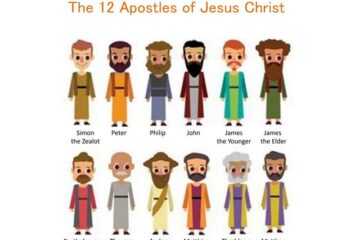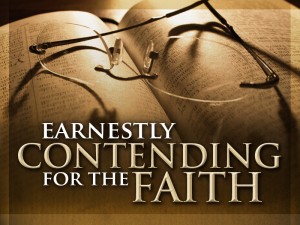Matthew 15:9 – Multiple Translations
- (KJV) “But in vain they do worship me, teaching for doctrines the commandments of men.”
- (CEV) “It is useless for you to worship me, when you teach rules made up by humans.”
- (GNB) “It is no use for them to worship me, because they teach human rules as though they were my laws!”
- (GW) “Their worship of me is pointless, because their teachings are rules made by humans.”
- (ISV) “Their worship of me is empty, because they teach human rules as doctrines.”
In every translation of this important piece of scripture, the point is made clear. The teaching and practicing of false doctrines is vain and useless before God.
Additions to God’s laws reflect upon his wisdom, as if he had left out something which was needed, and which man could supply; in one way or other they always lead men to disobey God. How thankful ought we to be for the written word of God! Never let us think that the religion of the Bible can be improved by any human addition, either in doctrine or practice. Our blessed Lord spoke of their traditions as inventions of their own, and pointed out one instance in which this was very clear, that of their transgressing the fifth commandment. When a parent’s wants called for assistance, they pleaded, that they had devoted to the temple all they could spare, even though they did not part with it, and therefore their parents must expect nothing from them. This was making the command of God of no effect. The doom of hypocrites is put in a little compass; “In vain do they worship me.” It will neither please God, nor profit themselves; they trust in vanity, and vanity will be their recompence.
In vain do they worship me… – This worship is all idle, empty, and without profit, because they teach as doctrines the commandments of men. They are mere “forms”. Those “forms” are introduced by man without authority. This rebuke to the Pharisees, who had added to the law of Moses many traditional human precepts, applies equally to all modern religionists who have modified or added to doctrine of Christ and the apostles. Whatever one cannot find in the New Testament is of such a character. This includes musical instruments such as the piano (which was invented 1700 years after the walk of Christ upon this earth), observance of saints’ days, of Christmas, of Lent, of Easter, the removal of the cup in the Lord’s Supper from the laity, infant sprinkling. It also includes church structure such as presidents, boards, archbishops, church creeds and shibboleths, are all of men and not of God. Such systems put man between the member and Christ. The devout worshiper should go right to the New Testament for his religion, and reject every ordinance or precept that is not to be found there.
Teaching for doctrines… – The word “doctrines,” here, means the requirements of religion – things to be believed and practiced in religion. The plurality of the statement “doctrine(s)” identifies the division prevalent in denominationalism.
God only has a right to declare what shall be done in his service; but they held their traditions to be superior to the written word of God, and taught them as doctrines binding the conscience.
Isa. 29:13 – “And Jehovah said, Because this people draw near Me with their mouth, and with their lips honor Me, but have removed their heart far from Me, and their fear toward Me is taught by the command of men;”
Draw near – Namely, in acts of worship. With lips – With outward devotions. What this essentially means is; They do not pay me that love, and fear, and obedience, which I require. And, they worship me not in such a manner, as I have prescribed, but according to mens inventions, preferring the devices and traditions of their false prophets, before my institutions.
Joh 4:24 -God is a Spirit: and they that worship him must worship him in spirit and in truth.
God is a spirit,…. Or “the Spirit is God”; a divine person, possessed of all divine perfections, as appears from his names, works, and worship ascribed unto him; “God is a spirit”; that is, God, Father, Son, and Holy Ghost: for taking the words in this light, not one of the persons is to be understood exclusive of the other; for this description, or definition, agrees with each of them, and they are all the object of worship, and to be worshipped in a true and spiritual manner. God is a spirit, and not a body, or a corporeal substance: the nature and essence of God is like a spirit, simple and uncompounded, not made up of parts; nor is it divisible; nor does it admit of any change and alteration. God, as a spirit, is immaterial, immortal, invisible, and an intelligent, willing, and active being; but differs from other spirits, in that he is not created, but an immense and infinite spirit, and an eternal one, which has neither beginning nor end: he is therefore a spirit by way of eminency, as well as effectively, he being the author and former of all spirits: whatever excellence is in them, must be ascribed to God in the highest manner; and whatever is imperfect in them, must be removed from him:
and they that worship him; worship is due to him on account of his nature and perfections, both internal and external; with both the bodies and souls of men; and both private and public; in the closet, in the family, and in the church of God; as prayer, praise, attendance on the word and ordinances:
must worship him in spirit and in truth; in the true and spiritual manner before described, which is suitable to his nature, and agreeably to his will.
BE NOT DECEIVED!
Col 2:18 – Let no man beguile you of your reward in a voluntary humility and worshiping of angels, intruding into those things which he hath not seen, vainly puffed up by his fleshly mind,
Your reward or prize; the allusion is to the Olympic games, one of which was running races; the race plot was fixed, a mark set up to look and run to, a corruptible crown disquised as uncorruptible proposed to be run for, and which was held by one who sat as judge, and determined who got the victory, and to whom the crown belonged; these judges sometimes acted the unfair part, and defrauded the victors of their proper right, and to such the apostle compares the false teachers.
The Christian’s reward, or prize he is running for, is the incorruptible and never fading crown of glory, life, and righteousness; the race plot is the Christian life, spent in the exercise of grace, and discharge of duty, and in holding fast, and holding out in a profession of faith unto the end; the mark he looks at, and presses towards, is Jesus Christ; and his great concern, the apostle by this metaphor suggests should be, lest by false teachers he should be defrauded of the prize of the high calling of God, through their removing the mark of Christ from him, by denying his person and Godhead; or by intercepting his sight of him, placing other objects before him, such as angels, to be worshipped and adored; or by darkening of it, joining Moses and Christ, law and Gospel, works and grace together, in the business of salvation; whereby he might seem to come short, or be in danger of coming short of the heavenly glory.
Col 2:23 – These things indeed have a reputation of wisdom in self-imposed worship and humility, and unsparing severity of the body, but are not of any value for the satisfying of the flesh.
Which things have indeed a show of wisdom – All these prescriptions and rites have indeed the appearance of wisdom, and are recommended by plausible reasons; but they form a worship which God has not commanded, and enjoin macerations of the body, accompanied with a humiliation of spirit, that are neither profitable to the soul, nor of any advantage to the body; so that the whole of their religion is nothing worth.
We are personally responsible for our behavior in worship whether as participants or leaders. To worship according to the “times” is to truly miss the mark and allow our prize to be stolen. Whatever is done in worship if it is not done in accordance with what God has authorized, is done as sin and in vain.


